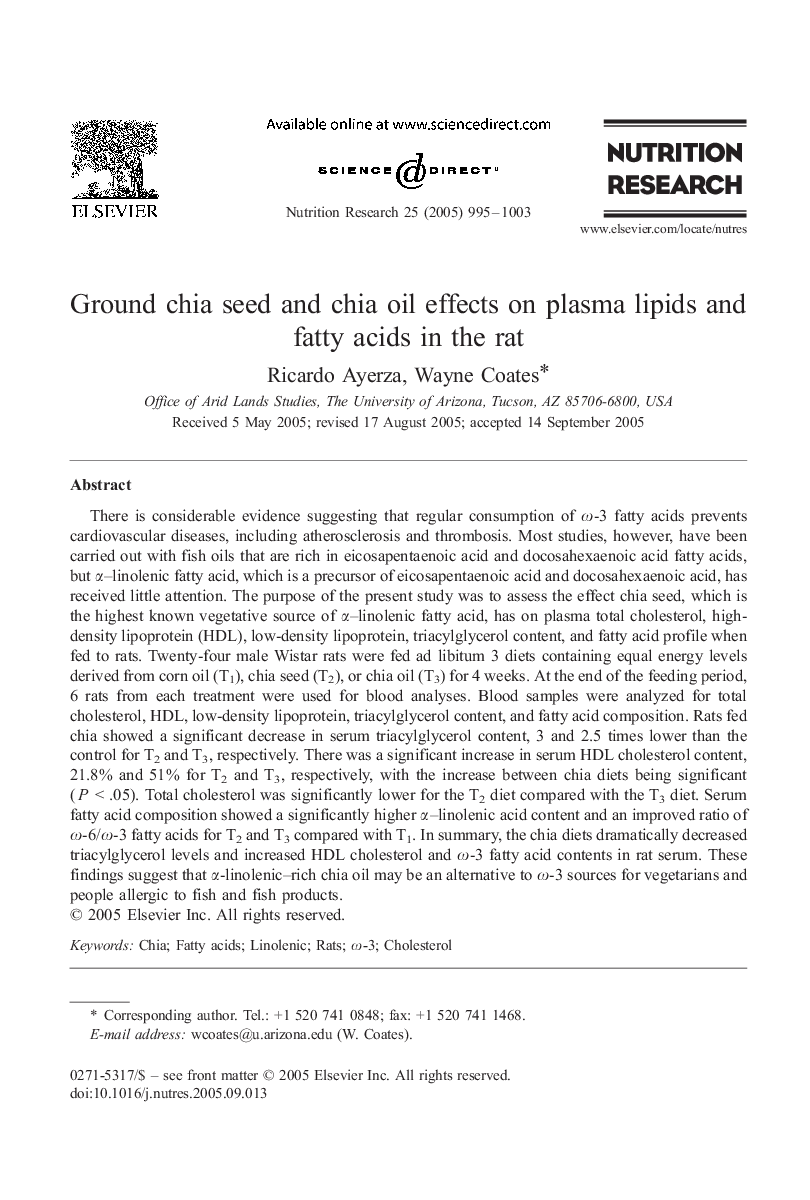| کد مقاله | کد نشریه | سال انتشار | مقاله انگلیسی | نسخه تمام متن |
|---|---|---|---|---|
| 9118965 | 1158060 | 2005 | 9 صفحه PDF | دانلود رایگان |
عنوان انگلیسی مقاله ISI
Ground chia seed and chia oil effects on plasma lipids and fatty acids in the rat
دانلود مقاله + سفارش ترجمه
دانلود مقاله ISI انگلیسی
رایگان برای ایرانیان
کلمات کلیدی
موضوعات مرتبط
علوم زیستی و بیوفناوری
بیوشیمی، ژنتیک و زیست شناسی مولکولی
علوم غدد
پیش نمایش صفحه اول مقاله

چکیده انگلیسی
There is considerable evidence suggesting that regular consumption of Ï-3 fatty acids prevents cardiovascular diseases, including atherosclerosis and thrombosis. Most studies, however, have been carried out with fish oils that are rich in eicosapentaenoic acid and docosahexaenoic acid fatty acids, but α-linolenic fatty acid, which is a precursor of eicosapentaenoic acid and docosahexaenoic acid, has received little attention. The purpose of the present study was to assess the effect chia seed, which is the highest known vegetative source of α-linolenic fatty acid, has on plasma total cholesterol, high-density lipoprotein (HDL), low-density lipoprotein, triacylglycerol content, and fatty acid profile when fed to rats. Twenty-four male Wistar rats were fed ad libitum 3 diets containing equal energy levels derived from corn oil (T1), chia seed (T2), or chia oil (T3) for 4 weeks. At the end of the feeding period, 6 rats from each treatment were used for blood analyses. Blood samples were analyzed for total cholesterol, HDL, low-density lipoprotein, triacylglycerol content, and fatty acid composition. Rats fed chia showed a significant decrease in serum triacylglycerol content, 3 and 2.5 times lower than the control for T2 and T3, respectively. There was a significant increase in serum HDL cholesterol content, 21.8% and 51% for T2 and T3, respectively, with the increase between chia diets being significant (P < .05). Total cholesterol was significantly lower for the T2 diet compared with the T3 diet. Serum fatty acid composition showed a significantly higher α-linolenic acid content and an improved ratio of Ï-6/Ï-3 fatty acids for T2 and T3 compared with T1. In summary, the chia diets dramatically decreased triacylglycerol levels and increased HDL cholesterol and Ï-3 fatty acid contents in rat serum. These findings suggest that α-linolenic-rich chia oil may be an alternative to Ï-3 sources for vegetarians and people allergic to fish and fish products.
ناشر
Database: Elsevier - ScienceDirect (ساینس دایرکت)
Journal: Nutrition Research - Volume 25, Issue 11, November 2005, Pages 995-1003
Journal: Nutrition Research - Volume 25, Issue 11, November 2005, Pages 995-1003
نویسندگان
Ricardo Ayerza, Wayne Coates,